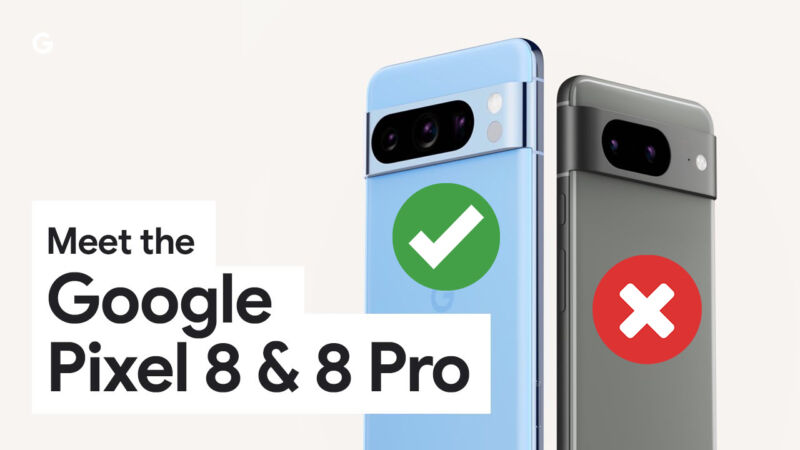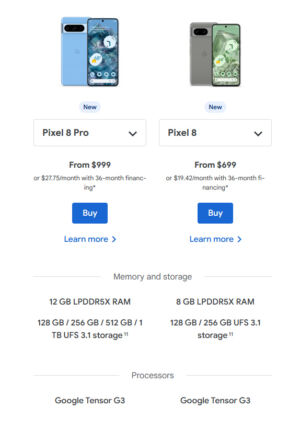
If you believe Google’s marketing hype, AI in a phone is really, really important, the best AI is Google’s, and the best place to get that AI is Google’s flagship smartphone, the Pixel 8. We’re five months removed from the launch of the Pixel 8, and that doesn’t seem like a justifiable position anymore: Google says its latest AI models can’t run on the Pixel 8.
Google dropped that news in a Mobile World Congress wrap-up video that was spotted by Mishaal Rahman. At the end of the show in a Q&A session, Googler Terence Zhang, a member of the Gemini-on-Android team, said “[Gemini] Nano will not be coming to the Pixel 8 because of some hardware limitations. It’s currently on the Pixel 8 Pro and very recently available on the Samsung S24 family. It’ll be coming to more high-end devices in the near future.”
That is a wild statement. Gemini is Google’s latest AI model, and it made a big deal of the launch last month. Gemini comes in a few different sizes, and the smallest “Nano” size is specifically designed to run on smartphones as a much-hyped “on-device AI.” The Pixel 8 and Pixel 8 Pro are Google’s flagship smartphones. Google designed the phone and the chip and the AI model and somehow can’t make these things play nice together?
Adding to the weirdness is that Gemini Nano can run on the Pixel 8 Pro but not the smaller Pixel 8 due to “hardware limitations.” What limitations would those be, exactly? The two phones have the exact same Google Tensor SoC. They run the same software. The main differences between the two phones are screen size (6.7 inches versus 6.2), battery size, a different camera loadout, and 8GB of RAM versus 12GB. RAM is the only known difference you can point to that could create a processing limitation, but Gemini Nano also runs on the Galaxy S24 series, where the base model has 8GB of RAM. RAM being the issue would mean Samsung phones are somehow more RAM efficient than Pixel phones, which is hard to believe. If the Pixel 8 Pro Tensor 3 and Pixel 8 Tensor 3 are different somehow, that’s not on the spec sheet.
Five months ago at the Pixel 8 launch event, Google painted a very different picture of the Pixel 8 series: “I’m excited to introduce you to the next evolution of AI in your hand, Google Pixel 8 Pro and Google Pixel 8. Our latest phones bring together so many technologies from across Google. They’re the first phones to use our latest Google Tensor chip. They include the very best Android experience, first-of-its-kind camera experiences, and the latest AI advancements from Google.” Both devices feature the custom Google Tensor 3 SoC that Google claimed was “designed specifically to bring Google’s AI breakthroughs directly to Pixel users and show the world what’s possible.” This custom Google AI-focused design was supposed to deliver “unbelievably helpful experiences that no other phone can.”

When you launch two phones at once, it’s always hard to distinguish what the actual differences between the two models are. Sometimes, the devices get talked about in the plural, while other times “Pixel 8” is used to represent both devices. Sometimes, the more expensive device is singularly mentioned for no reason other than it’s the more expensive flagship. Between the hour-long presentation and private press pre-briefing that Ars was a part of, “What’s the difference” became a pretty well-worn question that was expected to be answered clearly. Usually, the go-to delineator here is the spec sheet, which is expected to spell out in clear language what you’re actually buying. The Google Store has a compare page where you can directly pit the Pixel 8 and Pixel 8 Pro against each other, and nothing spells out a difference in AI processing capabilities or a difference in the Tensor chips.
In the case of the Pixel 8 and Pixel 8 Pro, Google wasn’t clear enough in its communication at launch. Today, though, re-watching the launch presentation with the new knowledge that there is some dramatic difference in AI processing capabilities, you can pick up some language like talk of the “Pixel 8 Pro’s on-device LLM” that you could now interpret as a declaration of exclusive AI capabilities for the Pro model, but that wasn’t clear at the time.
As a consumer, it’s hard not to feel misled, and it’s embarrassing for Google, but to practically care about this, you’d need to know what the heck “Gemini Nano” actually does and why you should care about it. That’s a hard question to answer. Google has a page up here detailing some of the features Gemini Nano powers on the Pixel 8 Pro, but a feature could also be powered by different models on different devices. For what it’s worth, the rundown lists a “summarize” feature for the Google Recorder app and “smart reply” in Gboard. Plenty of Google apps already have a “smart reply” feature without Gemini Nano. Third-party developers can also plug into the onboard Gemini Nano model for their apps, but it’s hard to imagine anyone doing that with such limited device support.
The other option is to just forget about doing all of this AI stuff on-device and just do it in the cloud. As a great example of this, none of this Gemini Nano stuff has anything to do with the Google Gemini Chatbot, which all runs in the cloud. A big question is what this will mean for the smaller Google Pixel 8 going forward. Google promised seven years of OS updates for the new Pixels, and to already be stripping down features due to “hardware limitations” after five months is a disappointment.
https://arstechnica.com/?p=2008918

